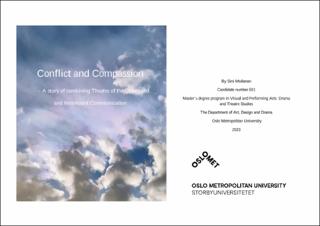| dc.contributor.advisor | Eeg-Tverbakk, Camilla | |
| dc.contributor.advisor | Gürgens Gjærum, Rikke | |
| dc.contributor.author | Moilanen, Sini | |
| dc.date.accessioned | 2023-11-24T08:22:00Z | |
| dc.date.available | 2023-11-24T08:22:00Z | |
| dc.date.issued | 2023 | |
| dc.identifier.uri | https://hdl.handle.net/11250/3104462 | |
| dc.description.abstract | This is a qualitative practice-led research on how the Theatre of the Oppressed (TO) and Nonviolent Communication (NVC) can complement each other as methodological traditions. It is based on experiences from a workshop conducted for adults interested in learning the basics of NVC and exploring them with techniques of the TO. Methods of data gathering include the workshop itself as well as interviews. Besides the empirical founds, I discuss the origin of these methods and how they can affect each other when combined.
The founds indicate that TO can offer a functioning arena for the practice of NVC. The aesthetic properties and the body’s involvement are beneficial for understanding the concepts of NVC. NVC can contribute to TO with a further understanding of the mechanics of oppression through language and provides concrete tools for navigating conflict in a life-enriching way. These methods can support each other and create a comprehensive methodology for learning to recognise violence and oppression at different levels of experience and exploring concrete action strategies for liberation. | en_US |
| dc.description.abstract | Dette er en kvalitativ praksis-ledet forsking om hvordan De Undertryktes Teater (DUT) og Ikkevoldskommunikasjon (IVK) kan utfylle hverandre som metodologiske tradisjoner. Den er baser på erfaringer fra en workshop gjennomført for voksne som er intressert i å utforske grunnleggende IVK gjennom teknikker fra DUT. Metoder for datainnsamling inkluderer selve workshoppen og intervjuer. I tillegg til de empiriske funnene, diskuterer jeg opprinnelsen til desse metodene og hvordan de kan påvirke hverandre når de kombineres.
Funnene indikerer at DUT kan tilby en funksjonell arena for utøvelse av IVK. De estetiske egenskapene og kroppens involvering viser seg gunstig for å forstå konseptene i IVK. IVK komplimenterer DUT med en ytterligere forståelse av mekanismen bak undertrykkelse gjennom språk og gir konkrete verktøy for å navigere konflikter på en livsberikende mate. Disse metodene kan skape en utfyllende metodikk for å lære å gjenkjenne vold og undertrykkelse på ulike erfaringsnivåer og utforske konkrete handlingsstrategier for frigjøring. | en_US |
| dc.language.iso | eng | en_US |
| dc.publisher | OsloMet-Storbyuniversitetet | en_US |
| dc.title | Conflict and Compassion | en_US |
| dc.type | Master thesis | en_US |
| dc.description.version | publishedVersion | en_US |
